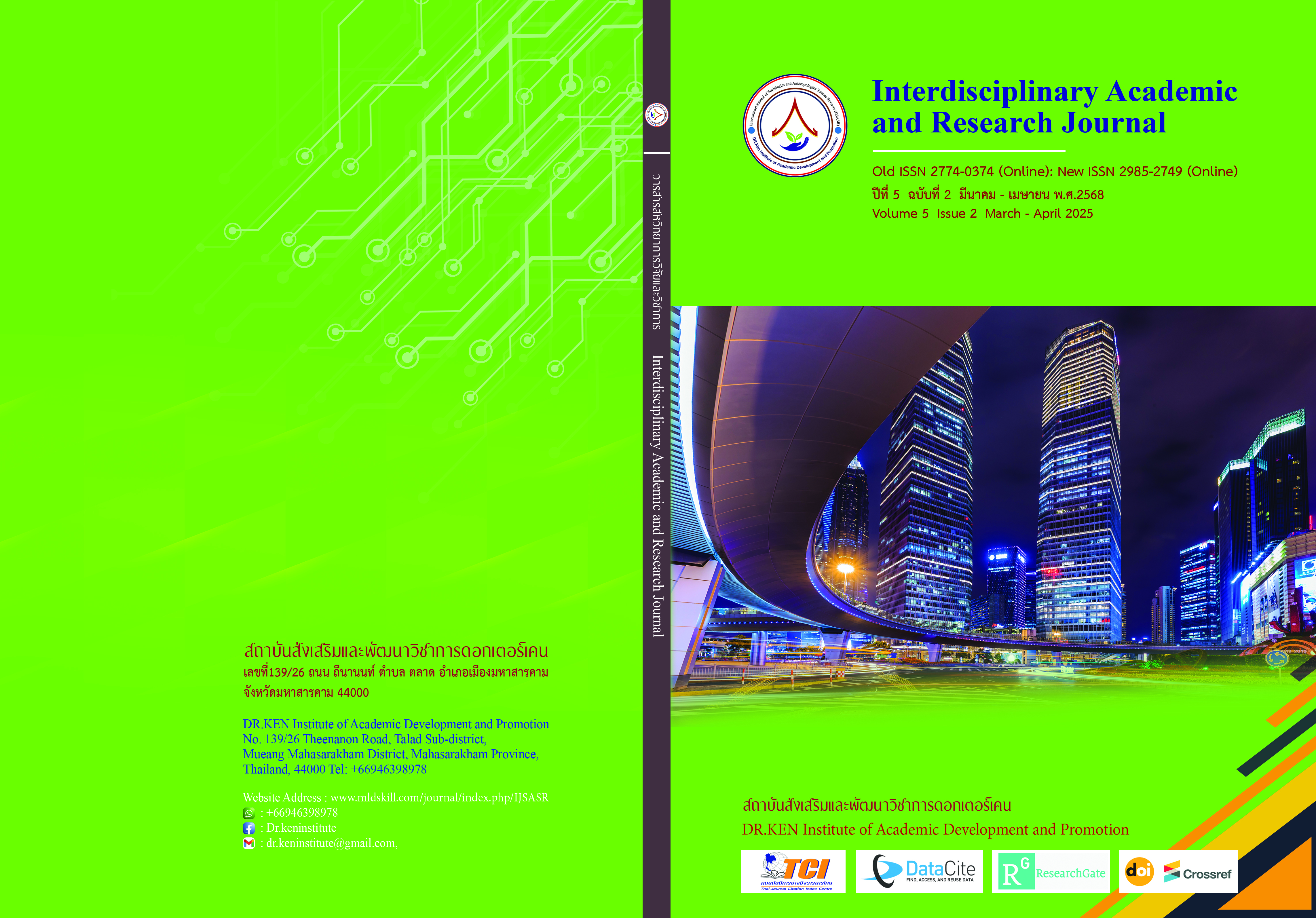The Guidelines on Water Treatment System Management with Innovation for Sustainable Local Development
DOI:
https://doi.org/10.60027/iarj.2025.282069Keywords:
Management, Water Treatment System, Innovation, Local DevelopmentAbstract
Background and Aims: The water treatment system is an important system to help improve the water as quality and standards for consumption. The working principle of the water treatment system, which draws water from natural water sources such as surface water and groundwater, is to enter the water production process. This process has various problems, such as unclean water, contamination, and damage to machinery in the production system, which affect the water quality used to produce non-quality. Therefore, the water treatment system innovation is used to transmute natural raw water through a filtration process until it becomes clear, clean, and safe water. This article aims to study the management approach of water supply systems with innovation for sustainable local development.
Methodology: This article is written by reviewing relevant academic documents, conducting content analysis, and presenting a descriptive presentation of the study objectives.
Results: There are innovations to solve problems and operations to achieve success. Not only does it have a good water treatment system structure, but it must also have good management, standards, and cooperation from many related departments. Moreover, it must give importance to every production process and the system implementation with modern technology under the management of the organization, with innovation consisting of 3 levels, which are the strategy level, the operation level, and the foundation level. For organization can adapt to change, bring benefits to the people who consume quality water, and provide guidelines for improving and developing the local water treatment system to be more modern and efficient.
Conclusion: The results show that a successful water treatment system requires innovation, effective management, and cross-departmental collaboration. A comprehensive approach, including strategic, operational, and foundational levels of innovation, is required to adapt to changes and provide high-quality water to the public.
References
กรมทรัพยากรน้ำ. (2561). หลักเกณฑ์และมาตรฐานคุณภาพระบบประปาหมู่บ้าน. กรุงเทพมหานคร: สำนักงานกิจการโรงพิมพ์องค์การสงเคราะห์ทหารผ่านศึกในพระบรมราชูปถัมภ์.
กรมส่งเสริมการปกครองท้องถิ่น. (2565). คู่มือหลักเกณฑ์และมาตรฐานคุณภาพระบบประปาหมู่บ้านขององค์การปกครองส่วนท้องถิ่น. กรุงเทพมหานคร: กรมส่งเสริมการปกครองท้องถิ่น.
กฤษฎา เสกตระกูล. (2563). นวัตกรรม: ความหวังใหม่เพื่อฟื้นฟูไทยกลับมา. Retrieved September 18, 2024, from: https://www.live-platforms.com/th/education/artice/7432/
กาญดา โกศัย. (2555). กระบวนการยอมรับนวัตกรรม. Retrieved September 18, 2024, fromซ https://www.gotoknow.org/posts/494344
ธีระ ทัศนเทพ และคณะ. (2558). การบริหารประปาหมู่บ้านและพฤติกรรมการใช้น้ำของประชาชน. วารสารการส่งเสริมสุขภาพและอนามัยสิ่งแวดล้อม, 20(4), 15-21.
มยุรี โยธาวุธ. (2560). การบริหารจัดการระบบประปาหมู่บ้านของจังหวัดนครนายก. วารสารสุทธิปริทัศน์, 31(101), 25-35.
สำนักงานคณะกรรมการดิจิทัลเพื่อเศรษฐกิจและสังคมแห่งชาติ. (2562). นโยบายและแผนระดับชาติว่าด้วยการพัฒนาดิจิทัลเพื่อเศรษฐกิจและสังคม (พ.ศ. 2561-2580). Retrieved September 18, 2024, from https://ict.moph.go.th/upload_file/files/daa49779bd3cd0c06774529009f03f1e.PDF
สุรเดช จองวรรณศิริ. (2562). การจัดการสู่องค์กรนวัตกรรม. กรุงเทพมหานคร: ทริปเปิลว้าว คอร์ปอเรชั่น.
Downloads
Published
How to Cite
Issue
Section
License
Copyright (c) 2025 Interdisciplinary Academic and Research Journal

This work is licensed under a Creative Commons Attribution-NonCommercial-NoDerivatives 4.0 International License.
Copyright on any article in the Interdisciplinary Academic and Research Journal is retained by the author(s) under the under the Creative Commons Attribution-NonCommercial-NoDerivatives 4.0 International License. Permission to use text, content, images, etc. of publication. Any user to read, download, copy, distribute, print, search, or link to the full texts of articles, crawl them for indexing, pass them as data to software, or use them for any other lawful purpose. But do not use it for commercial use or with the intent to benefit any business.
















.png)


